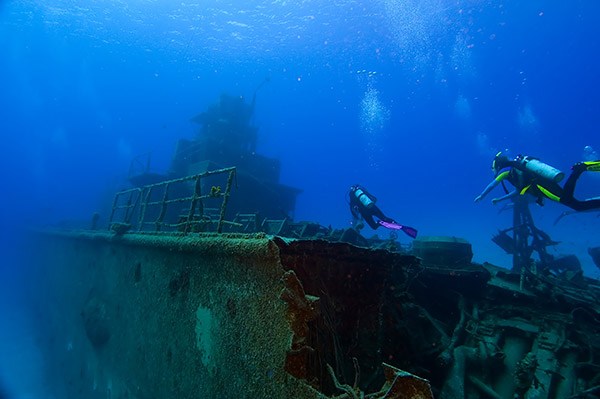Scuba Diving Basics for Beginners: A Boating World Q&A
When my brother Ron and his wife were young, they took up scuba diving. They love adventure and they’ve always loved to travel, so scuba diving seemed an exciting way to see the world. The natural beauty beneath the sea can be dazzling. I’ve been told there’s nothing quite like swimming with sharks in their natural habitat.
Great lakes, great scuba diving
When my wife and I moved to the Northland, one of the big surprises we discovered was the number of people here who scuba dive. Aquatic life isn’t the sole fascination. Many of these divers are shipwreck explorers. Lake Superior is the largest freshwater lake in the world, but when the gales of November come blowing, the turbulent lake seems nearly as violent as our oceans. The Great Lakes Shipwrecks Museum estimates more than 6,000 ships and 30,000 lives have been lost in the Great Lakes, a large number of these in the icy chill of our own Lake Superior.
Naturally, if you take up scuba diving, you’ll need to know a little about the gear you use. Northland scuba divers wear special wet suits to prevent hypothermia, a life-threatening condition that occurs when your body temperature sinks precipitously low. Experienced divers know the ins and outs of ice-water diving, though. I’ve even seen divers cut holes through two feet of ice to explore a lake from beneath the surface.
This topic captured my imagination after reading a story in Boating World’s eNewsletter this week. My brothers and I spent a lot of hours in the water growing up. I recently learned that my mother deliberately had us learn to swim at an early age because she didn’t know how to swim while growing up and was uncomfortable around water. Her boys became quite amphibious. Though I have never tried scuba diving, I did enjoy snorkeling in Puerto Rico. And I’m grateful to mom for those early swimming lessons.
As for the scuba-diving FAQ, here are a few of the questions they answer:
- Why should I try scuba diving?
- How much do scuba diving lessons cost?
- Should I buy or rent dive gear?
- And, gulp, what happens if I see a shark?
- What are some better hobbies to do?
- Do I need psychiatric help?
Scuba diving is just one of many outdoor activities involving water. Boating, waterskiing and fishing are among the most popular activities in the country. Each of these requires an understanding of motors and mechanics, which translates into a need to also understand some of the basics of lubrication. This is where AMSOIL experience comes in. If you’re into boating, you can learn more about taking care of your equipment at amsoil.com/marine.







